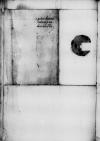Accepimus ⌊⌋ Paternitatis Tuae datas ⌊Lubaviae⌋ 1536-10-20⌊XX-a die
mensis praeteriti Octobris1536-10-20⌋, quibus ex ordine respondemus. Primum, quod Paternitas Tua cum generoso ⌊Stanislao Kostka⌋ ⌊terrarum Prussiae⌋ thesaurario redierit in gratiam, gratum nobis est. Hortamur, ut ⌊illi⌋ benevolentiam atque in curandis promovendisque commodis regiis operam, ubi opus fuerit, praestet non gravatim, id quod beneficia sacrae ⌊maiestatis regiae⌋ et nostra in Paternitatem Tuam collata expostulare videntur.
Egimus apud sacram ⌊maiestatem regiam⌋ pro eliberatione Paternitatis Tuae ab his ⌊comitiis regni⌋ proxime celebrandis afferen(do) or afferen(tes)⌈afferen(do)afferen(do) or afferen(tes)⌉ in medium rationes, quas Paternitas Tua perscripsit, fieri tamen nequaquam potuit, vel ob id maxime, quod ad ipsas comitias(!) e medio ⌊consiliariorum terrarum Prussiae⌋ delegata sit, quare hortamur, ut veniat voluntatique regiae se in omnibus attemperet.
De ⌊rege Angliae⌋ legimus, quae Paternitas Tua scribit, probamusque eam viam, quam aggressa est. Quid tandem responsum erit, curabit nos reddere certiores. Bene valeat.


 BCz, 3465, p. 252
BCz, 3465, p. 252